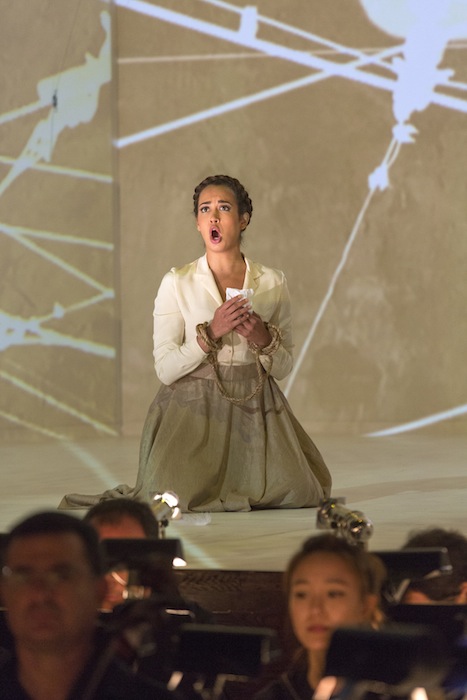Strong singing illuminates Mostly Mozart’s opera mashup

Nadine Sierra performs in “The Illuminated Heart” at opening night of the Mostly Mozart Festival. Photo: Richard Termine
It’s not easy to come up with a precise label for “The Illuminated Heart,” the official opening presentation of the 2016 Mostly Mozart Festival. A staged selection of arias and ensemble numbers from Mozart’s operas, the ninety-minute mashup devised by British director Netia Jones is by no means a dramatic unit; to try to draw a coherent narrative through the piece as it jumps from one story to the next would be futile. And yet it is not quite a concert performance either, as in Monday’s opener the commitment of director and actors to the dramatic force of each scene was readily apparent.
In effect, “The Illuminated Heart” is two things: a tribute to the particular genius of Mozart’s operatic works, and a celebration of the Festival itself. Now in its 50th year, Mostly Mozart has come a long way from being a staid organization with a limited focus to reinvigorating itself as a polished and versatile institution that stands out in the summer calendar.
A good deal of credit for that development, at least in recent years, is owed to music director Louis Langrée, whose roughly fifteen years of stewardship have made the Festival’s resident orchestra into an enviable asset. In the overture to Le Nozze di Figaro, which opened the evening, they were simply dazzling, playing with a bright shine and impeccable precision. Unusually deferential to the woodwinds, Langrée’s reading was beautifully balanced, teasing every thrilling detail out of the score.
The selection of vocal excerpts that followed was idiosyncratic, pairing scenes from the three Da Ponte collaborations with items from operas as far-flung as the unfinished Zaide. And while the costumes and digital projections assembled by Jones and colleagues seemed little more than eye-candy, every scene showed a superior level of performance, thanks to a cast that any major opera company would have been thrilled to assemble.
Ana María Martínez made a strong impression right away, positively glowing in her appearances as Fiordiligi, opposite Daniela Mack’s enchanting Dorabella. Martinez’s best work, though, was in her turn as Donna Elvira, giving a compelling, fully invested rendition of “Mi tradi quell’álma ingrata.” There is a beautiful caramel color to her voice that comes out especially well in softly sung passages.
Peter Mattei was not in consistent voice Monday, sounding tired in his later selections, but it was clear why he remains so prized for his dramatic interpretations. He gave a riveting account of Count Almaviva’s soliloquy “Vedrò mentr’io sospiro,” and elicited both charm and revulsion as an incorrigible lech in his scene “Crudel! Perchè finora,” opposite Nadine Sierra, whose lively presence and secure voice made her a valuable member of the cast in her own right. The young soprano was especially moving in “Ruhe sanft, mein holdes Leben,” the title character’s lead aria from Zaide.
The evening’s highlight was provided by Matthew Polenzani, who shone brilliantly in one of his standbys, Don Ottavio’s “Dalla sua pace” from Don Giovanni. His instrument may not be naturally beautiful, sounding less robust and even a touch nasal at times. But whenever he sings this repertoire, it feels like a masterclass in vocal control: he shaped his phrases with care and skill, and channeled them into a passionate interpretation of the aria, managing a superb contrast between his soft, gauzy textures and brief moments of forceful determination.
Among all these performances, Christine Goerke’s performance of Electra’s aria “D’Oreste, d’Aiace” from Idomeneo seemed almost like a celebrity cameo. At this stage in her career she is becoming more and more associated with heavier roles, but to hear her return to this rep is a treat. Present, as ever, were her extraordinary vocal power and color, and she was fiercely committed to her scene, even though there was little context to tie it to.
No less impressive were the names further down the ticket. Marianne Crebassa offered a firm, confident mezzo sound in program’s trouser roles, and Christopher Maltman was impossibly affable singing Papageno’s birding song.
For these performances, the first several rows of David Geffen Hall have been removed to make room for a pit, while a white box taking up most of the stage serves as the playing area. The enclosure had the fortunate side effect of serving as a perfect acoustic amplifier for the singers, allowing the orchestra to play at full volume without fear of covering them, a sort of makeshift “Szell shell.” Acousticians overseeing the hall’s renovation, take note.
“The Illuminated Heart” will be repeated 7:30 p.m. Tuesday at David Geffen Hall. mostlymozart.org


